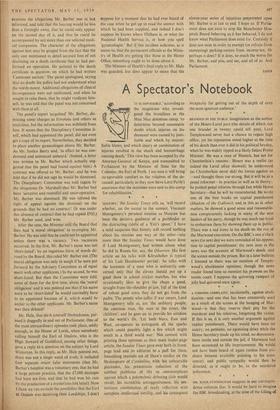BRANDED IN THE PUBLIC imagination as the author of the
Hoare-Laval pact (the details of which not one brander in twenty could tell you), Lord Templewood never had a chance to regain high office; yet his reputation stood higher at the time of his death than ever it did in his political heyday, when he was widely tipped as a likely future Prime Minister. He was a man of Munich, but not for Chamberlain's reasons: Hoare was a realist (as indeed the Laval affair showed); he understood (as Chamberlain never did) the forces against us —and thought them too strong. But it will be as a penal reformer—in practice as well as in theory : he pushed penal reforms through fast while Home Secretary—that he will be remembered. He wrote one of the best books on capital punishment (Shadow of the Gallows); and in this as in other matters, he showed a good sense and reasonable- ness conspicuously lacking in many of the new leaders of his party, though he was much too loyal to embarrass them by showing them up in
There was a sad irony in his death on the eve of the Marwood execution. On the BBC's one o'clock news the next day we were reminded of his opposi- tion to capital punishment; the next item in the news was the account of Marwood's death, and the scenes outside the prison. But in a later bulletin I listened to there was no mention of Temple- wood's abolitionist opinions, though the news reader found time to mention his prowess on the tennis court. I suppose the quivering rampart of jelly had quivered once again.


































 Previous page
Previous page